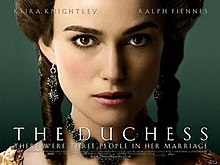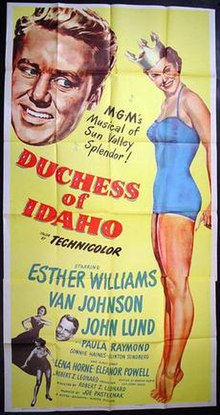The Duchess is a 2008 British drama film directed by Saul Dibb. It is based on Amanda Foreman's biography of the 18th-century English aristocrat Georgiana Cavendish, Duchess of Devonshire. It was released in September 2008 in the UK.
Plot

Set in the late 18th century, the story follows the life of Georgiana Cavendish, Duchess of Devonshire. Well known for her beauty and fashion sense, she is also known for her extravagance and gambling habits. Despite the blatant infidelities of her husband, the cold and much older William Cavendish, the 5th Duke of Devonshire, Georgiana thrives, becoming a fashion icon, a doting mother, a shrewd political operator, and darling of the common people. In befriending Lady Bess Foster, Georgiana is crushed when Bess and The Duke begin an affair. Despite Georgiana's anger, the Duke wants Bess to remain living with them. Bess later explains to Georgiana that the reason she began the affair with the Duke was so that she could get her children back. The Duke wants a male heir, which the Duchess has not yet provided. The idea is that Bess can, since she already has three sons, of whom the Duke is very fond, treating them as if they were his own.
In response to the betrayal she experiences at home, Georgiana allows herself to develop feelings for Charles Grey. However, when she asks the Duke permission to have him as a lover, the Duke is enraged and in a fit of violence, rapes Georgiana. The rape leads to a pregnancy and a son, William Cavendish, is born. After producing a male heir, Georgiana (with the help of Bess) begins a love affair with Charles Grey, which leads to another pregnancy. The Duke threatens to not only end Charles' political career but also to forbid Georgiana from seeing her children again if she does not end the relationship. For the sake of her children, Georgiana reluctantly stops seeing Charles. She is then sent to the countryside where she secretly gives birth to their daughter, Eliza Courtney. However, she is forced to give the child over to Charles' family, the Greys.
For most of her married life, Georgiana, the Duke, and Bess live together. However, after the birth of Eliza, Lady Georgiana no longer seems to be bothered by the arrangement and she once again finds comfort in Bess' friendship. Towards the end of her life, the Duchess gives her blessing to the marriage of her husband and her best friend, who marry after Georgiana's death.
At the end of the film, we are told that Georgiana frequently visited her daughter Eliza, who was raised by Charles' parents. Eliza named her own daughter Georgiana.
At the end of the film it is strongly suggested that in consistently choosing the lesser of two evils in a situation she could not escape, Georgiana was able to rise above her circumstances to do the right thing for a higher cause. In fact, her children did grow up with a mother, and even the daughter she was obliged to give up knew that she loved her. Charles also became Prime Minister, leading the country in a way that Georgiana would have approved.
Main cast

- Keira Knightley as Georgiana Cavendish, Duchess of Devonshire
- Ralph Fiennes as William Cavendish, 5th Duke of Devonshire
- Hayley Atwell as Lady Elizabeth 'Bess' Foster
- Charlotte Rampling as Georgiana Spencer, Countess Spencer
- Dominic Cooper as Charles Grey, 2nd Earl Grey
- Aidan McArdle as Richard Brinsley Sheridan
- Simon McBurney as Charles James Fox
- Sebastian Applewhite as Augustus Clifford
- Calvin Dean as Devonshire House Servant
- Emily Jewell as Nanny
- Richard McCabe as Sir James Hare
- Bruce Mackinnon as actor playing Sir Peter Teazle in The School for Scandal
- Alistair Petrie as Heaton
- Georgia King as actress playing Lady Teazle in The School for Scandal
- Camilla Arfwedson as Lady Charlotte
Production
The Duchess was produced by British Qwerty Films and American Magnolia Mae Films, with financial support from BBC Films, French Pathé and Italian BIM Distribuzione. The film was shot at Twickenham Film Studios and on location at Chatsworth, Bath, Holkham Hall, Clandon Park, Kedleston Hall, Somerset House, King's College London and the Old Royal Naval College in Greenwich.
Regarding lead actress Keira Knightley, director Saul Dibb said The Duchess was "a chance to take a character from late childhood â€" she's married at 17 â€" into full adulthood, 10 years later." It was also a chance for Knightley to work with Ralph Fiennes, whom she regarded as one of her most accomplished co-stars to date; Dibb said, "When I said, 'We've got Ralph interested in playing the Duke', we both took a gulp and went, 'F---.' [sic] ... But I didn't for one second feel that she wasn't up to the task." Originally the film was to be directed by Susanne Bier.
Release
Marketing
Studio executives wanted to use digitally-altered images of Keira Knightley in promotional materials. The alterations were specifically aimed at enlarging her breasts. Knightley objected to the alterations and they were not used. The marketing campaign also drew criticism for its use of Diana, Princess of Wales, who was an indirect descendant of Georgiana's. The advertising used slogans such as "two women related by ancestry and united by destiny" and even used "There were three people in her marriage," the latter being an almost identical copy of a famous quote that Diana, Princess of Wales uttered during her Panorama interview. Michael Hellicar of the Daily Mail stated that "the Diana link is being so heavily, and it has to be said, so cynically and crudely promoted."
Amanda Foreman, author of Georgiana, Duchess of Devonshire, criticised the marketing strategy too, saying "They probably thought the only way to get the young popcorn-eating brigade to see the film was if they thought it was about Diana, but it wasn't necessary and they should never have done that. And the line 'united by destiny' is wrong. I don't think Georgiana actually died in a carriage crash".
Theatrical release
The BBFC has classified the film as a 12A, citing the scene of implied marital rape, which is "delivered through Georgiana's screams of protest, heard from outside the bedroom door." The BBFC's PG rating allows implied sex as long as it is discreet and infrequent; the board decided that the scene in The Duchess is more than "discreet" or "implied". The film had its world premiere on 3 September 2008, in Leicester Square and was released nationwide in the United Kingdom on 5 September.
Critical response
The film received mostly positive reviews. Rotten Tomatoes gives a score of 61% based on 163 reviews, with the consensus that "While The Duchess treads the now-familiar terrain of the corset-ripper, the costumes look great and Keira Knightley's performance is stellar in this subtly feminist, period drama."
Most reviewers highly praised Knightley and Fiennes' performances. Time Out London wrote: "[Saul Dibb] is also helped enormously by a mature, restrained portrayal from Knightley, a masterclass in passive aggression from Fiennes and a performance of tender seduction from Atwell." The Epoch Times writes, "Ralph Fiennes brings a human quality to [the Duke] by avoiding any intent, exaggeration or ill will" and "Keira Knightley's performance gains new depth â€" she not only perfectly portrays a witty and feminine Georgiana early in the film, but also a caring mother, and an abandoned woman later on. Also remarkable in this role is Knightley's ability to portray the strengths, weaknesses, and the internal hurdles of Georgiana, as well as her internal contemplation." Film Ireland writes "It is a slow movie but it is well acted with Knightley and Fiennes suited to their roles, especially Fiennes who gives a formidable and powerful performance." Cameron Baily, the co-chair of The Toronto International Festival comments; "The Duchess Of Devonshire, with Keira Knightley, which is a beautiful film and she gives a really mature performance. You're seeing her really turn into something beyond the kind of pretty face that we've seen her do already so well. But she's actually a very serious actress and she's turning into a great, great performer."
Peter Bradshaw of The Guardian wrote that "Dibb's movie looks good" but complained the film was "exasperatingly bland and slow-moving at all times" handing out a 2 of 5 star rating. However, Paul Hurley gave the film 8/10 and called The Duchess "an excellent new film" and states that "The Duchess stands a good chance of taking home some very big prizes at the end of the year".
Accolades
References

External links
- The Duchess in the British Film Institute's "Explore film..." database
- The Duchess at the Internet Movie Database

